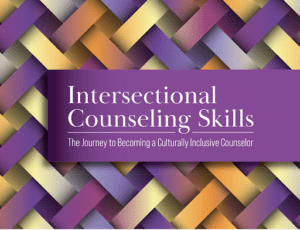Crisis Center employees help ‘write the book’ on counseling

Every mental health emergency brings its unique challenges that responders must be able to address while on the scene. But teaching others how to handle those cases based on their own experiences is another skill set.
Luckily for county residents, staff at the Alachua County Crisis Center know how to do both an are educating others on best practices in the event of an emergency in their region.
Later this fall, Cognella Academic Publishing will release the textbook “Intersection Counseling Skills: The Journey to Becoming a Culturally Inclusive Counselor” featuring a chapter co-written by two Alachua County Crisis Center employees Amanda DiLorenzo-Garcia and Brooke Gregory. The book will be widely available for others nationwide and taught in intro and technique counseling courses. It is written by experts in the field to help equip readers to be more culturally attuned and responsive to those in need.
“A goal of us publishing and sharing in a text that’s going to be so widely available is to demonstrate that our (Crisis Center) philosophy and our county’s approach is truly helpful for clients and citizens,” said DiLorenzo-Garcia, the lead author.
At the Alachua County Crisis Center, under the umbrella of the county’s Community Support Services department, DiLorenzo-Garcia serves as a clinical supervisor, while her co-author, Gregory, is a mobile response team coordinator who regularly arrives on the scene to mental health emergencies after calls from law enforcement, school counselors, or elsewhere in the community.
They are part of a team that offers around-the-clock crisis and suicide intervention services to all residents in Alachua County. The services include 24/7 crisis counseling, mobile response care teams, as well as ongoing counseling, emergency walk-in services during regular business hours, support for community trauma responses and public education.
The chapter, titled “Reflection of Meaning,” uses examples of how counselors can use this advanced skill in counseling sessions to help an individual in need of being more deeply understood.
“It’s about the importance and value of showing up for your community and letting people know someone is going to show up for them,” Gregory said.
Over the past 12 months, the Crisis Center team members responded to 398 calls from the thousands that came in. Gregory went on 89 of those calls.
“A lot of the time people who write textbooks have a Ph.D. and are in the academic world. Having someone like Brooke, who has a master’s degree and is doing clinical work, brings a perspective we should all appreciate,” DiLorenzo-Garcia said.
This is the second book chapter DiLorenzo-Garcia has co-written this year.
“Professional’s Guide to Trauma-informed Decision Making” was released this past spring, where she co-wrote the chapter “Honoring the Cultural Norms and Experiences of Military, Veteran and Law Enforcement Clients.”
“I don’t think I can quantify how important it is to be there and support someone. It feels so meaningful and so important,” she said. “We want to establish ourselves as an ideal and premiere crisis center and to be considered a model for others.”
Residents in need of assistance can dial “988” for the Suicide and Crisis Lifeline or call the 24/7 Crisis Line at 352-264-6789.
